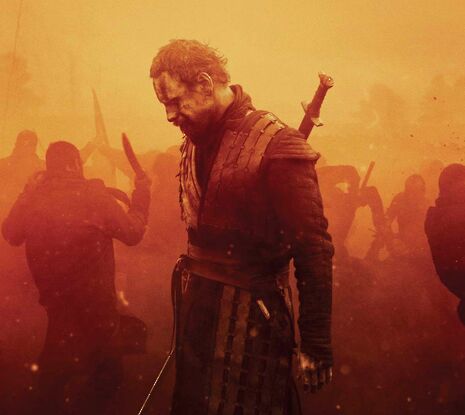Film: Macbeth
Alex Izza reviews Justin Kruzel’s “unusual” tackle of Shakespeare.

Shakespeare is always a huge task for any director to tackle. The complexities and seeming inaccessibility of the setting has led directors like Baz Luhrmann to take these tales and make them into something far more modern. Justin Kurzel, however, has created an imperfect film with moments of true brilliance that embraces the chaos of the past. This is not James McAvoy’s turn as Macbeth in a post-apocalyptic future. This is Michael Fassbender at the height of his acting power, a medieval lord willing to risk everything to claim power.
The film opens in a most unusual way for a depiction of Macbeth: the funeral of Lady Macbeth’s lost child. Kurzel, therefore, immediately looks to stamp his mark on Shakespeare films. Gone is the well-trodden order of the witches’ prophecy introducing the play. Instead we have a much more nuanced picture. The witches are still very present, and play an important part in the hypnotic, supernatural chaos of the later film. But his willingness to change the source material allows Kurzel to create more compelling and fantastically rounded characters.
We see Marion Cotillard as more than just the scheming wife she is and as a mother, with grief pushing her towards demonic forces to ensure her husband succeeds. Her range in this film from whispered, heart wrenching sorrow, to diabolical willingness to see the prophecy fulfilled, is a ringing endorsement of the talent Cotillard brings to every film she is in. Equally, Michael Fassbender is a man of war, haunted by the corpses of both men he had killed and those he allowed to die. In interviews Kurzel has gone as far as to characterise this Macbeth as suffering from Post Traumatic Stress Disorder – the terrible unsettling moments of Macbeth’s last scenes in the film are a testament to Fassbender’s Oscar-worthy talent.
It is in the cinematography and sound that the film really gets to the heart of the chaos and paranoia that eventually consume the Macbeth couple. The Scottish highlands are on stunning form, providing the sweeping vistas for the battles that define the start and end. The building redness of the very air surrounding Macbeth creates a sense of the imminence of Hell: his cries of “LUCIFER” alone on his throne is a startling image of the power of sin to destroy all. Indeed, there is a bit of Cambridge interest as well, with Ely Cathedral giving Fassbender a magnificent stage for Macbeth’s triumph and his eventual fall to “the scorpions of my mind.” But some of the most haunting scenes are defined by the score of Jed Kurzel. Its constant eerie quality unsettles the viewer, and solidifies our sense of Macbeth’s unease over the future. In one particular moment Kurzel builds to a hollow crescendo as cries of “Hail Macbeth” ring around his coronation.
The film, however, is not the perfect masterpiece reviews from The Telegraph would have you believe. The surreal nature of the piece does leave it slightly unhinged, with the liberties taken with the text leaving the middle section of the film feeling somewhat stilted. As a result, the madness of Macbeth and Lady Macbeth are potent, but strangely short scenes, losing the power these monologues usually have on a viewer. Indeed, it is important to note Fassbender and Cotillard do not define the film. Sean Harris is on scene-stealing form as Macduff. His final duel with Macbeth is filled with pure rage, creating this character on the brink of Hell, hooded and surrounded by flames to bring damnation upon Macbeth.
Ultimately Kurzel does a successful job at building a more nuanced and abstract image of Macbeth. By refusing to stick closely to the source material and focus instead on creating this hellish image of medieval life, he leaves certain scenes feeling loose within the overall narrative. It is a risk, however, that I think was worth it in continuing to develop how films explore character. This is more than just a warning of the forbidden fruit of power. It is about a man and woman stuck in a spiral of very tangible emotions. A mother torn apart by the loss of a child and embracing reunion in death. And then Macbeth: the warrior who eventually realises that the violence that got him his crown will wrench it from his grasp.
 News / Uni Scout and Guide Club affirms trans inclusion 12 December 2025
News / Uni Scout and Guide Club affirms trans inclusion 12 December 2025 News / Cambridge Vet School gets lifeline year to stay accredited28 November 2025
News / Cambridge Vet School gets lifeline year to stay accredited28 November 2025 News / Cambridge study finds students learn better with notes than AI13 December 2025
News / Cambridge study finds students learn better with notes than AI13 December 2025 Science / Did your ex trip on King’s Parade? The science behind the ‘ick’12 December 2025
Science / Did your ex trip on King’s Parade? The science behind the ‘ick’12 December 2025 News / Pembroke to convert listed office building into accom9 December 2025
News / Pembroke to convert listed office building into accom9 December 2025







